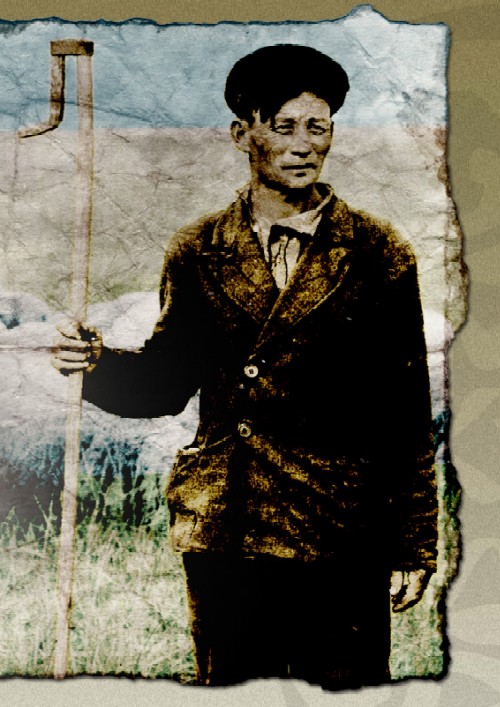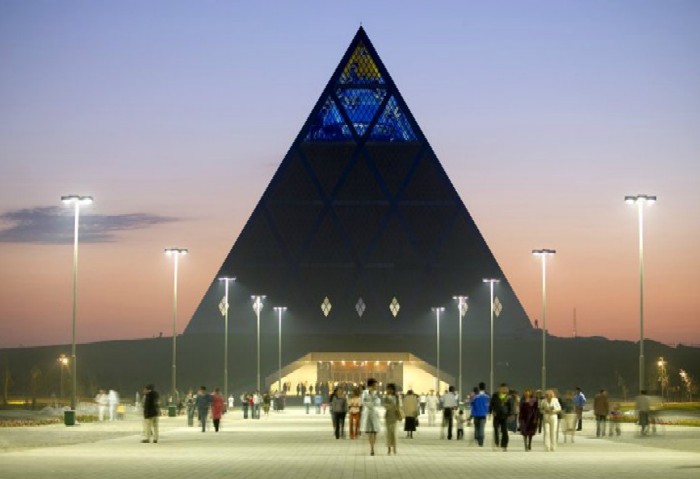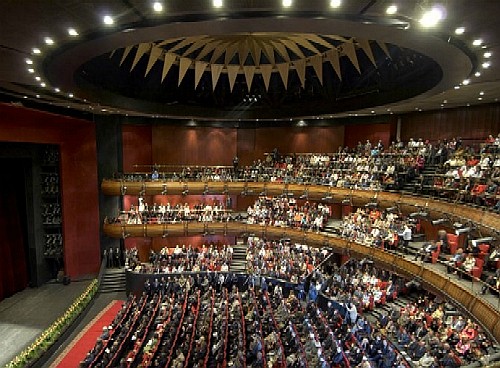
M usic can—and often does—transport us to places that no other artform can.”
— Anne LeBaron.
T his international project presents fresh ideas by opening new and often unexpected horizons of creativity. The serious nature and deep content and design of the cantata aroused genuine interest from the public. The Cantata is one of the most important international events of contemporary classical music in Central Asia.”T here are artistic projects that heal and redeem and enlighten. And then, to our even greater delight, there are those that achieve this across vast cultural and political chasms, auguring well for world peace.
— Aigul Beisenova, Business Kazakhstan.
A nne LeBaron’s Silent Steppe Cantata receives its world première today (10-DEC-2011) at the Palace of Peace and Reconciliation in Astana, Kazakhstan.
T he Silent Steppe Cantata Project is an artistic consortium, consisting of composer Anne LeBaron with her co-producer, tenor Timur Bekbosunov, plus filmmaker, Sandra Powers. The multi-media cantata is a sonic and visual portrait of Kazakhstan. Together with Bekbosunov, the Sary-Arka Folk Instrument Orchestra and the Chamber Choir of the Astana Philharmonic Society will perform the official premiere.

T he libretto incorporates Kazakh stories and mythology, and draws upon poems of Russian and Kazakh writers, including the poet Olzhas Suleimenov. Suleimenov has authored more than 16 volumes of poetry and prose, and his 1975 novel Az-i-Ia received both wide recognition in Kazakhstan and abroad, plus censure by Soviet authorities.

T he Palace of Peace and Reconciliation is a 77m high pyramid-shaped facility designed by Foster+Partners Architects and built by Sembol Construction at a cost of 8.74B Kazakh tenge (about USD$58M). Among other things, it houses a 1,500-seat concert/opera hall. It opened in late 2006. What a fitting venue for today’s première!
L istening to excerpts online, I am intrigued by the exposition of Kazakh ethnogenesis that the cantata and film portray. Without being revisionistic or grinding any particular philosophical “axes,” the cantata (the music, and the historical and contemporary texts comprising the libretto) reveals the inherently slippery, shifting imagination of Kazakh ethnic origins. It is their shifting, not a Western shifting; it is an indigenous acceptance of transitoriness/ephemerality that may derive from the primordial “geography” of the Kazakh nation and tribes. Acceptance without relativism/fatalism/determinism.
T he cantata demonstrates evidence of local elders and a musicoliterary elite struggling through the millennia to come to terms with the evolving political demarcations of Central Asia. Through their struggle, they created a handful of discrete ‘nationalities’, sustained through the centuries. If anything, the impression (from the bits of the cantata and film that we can experience online) is one of the indomitability of the spirit and of authentic human diversity. Needless adversity and suffering destroy things; they are never ‘noble’ or ‘desirable.’ But there is this residue of survivors—people, and music, and stories, and culture—and this once-dogged, now-expansive persistence of the will to peace. This cantata inspires as well as teaches!

W ish we could be there for the première!
- TheSilentSteppe.org
- Silent Steppe audio samples (site requires Flash player)
- Anne LeBaron website
- Timur Bekbosunov website, Silent Steppe Cantata multimedia page
- Sandra Powers (film-maker/director) website, 'Nomad's Song' page
- Palace of Peace & Reconciliation (Astana, Kazakhstan) at Foster+Partners.com (architects)
- Abazov R, ed. Green Desert: The Life and Poetry of Olzhas Suleimenov. (Levchin S, Bernstein I, trs.) Cognella, 2010.
- Edgar A-L. Tribal Nation. Princeton Univ, 2006.
- Golden P. Ethnicity and State Formation in Pre-Cinggisid Turkic Eurasia. Indiana Univ, 2001.
- Kohl P, Fawcett C, eds. Nationalism, Politics and the Practice of Archaeology. Cambridge Univ, 1996.
- Ram H. Imagining Eurasia: The poetics and ideology of Olzhas Suleimenovs AZ i IA. Slavic Rev 2001;60:289-311.
- Shnirelman V. Who Gets the Past? Competition for Ancestors among Non-Russian Intellectuals in Russia. Johns Hopkins Univ, 1996.
- Suleimenov O. Contemporary Literature in Kazakhstan and Eurasia. Harriman Inst, 2009.
No comments:
Post a Comment